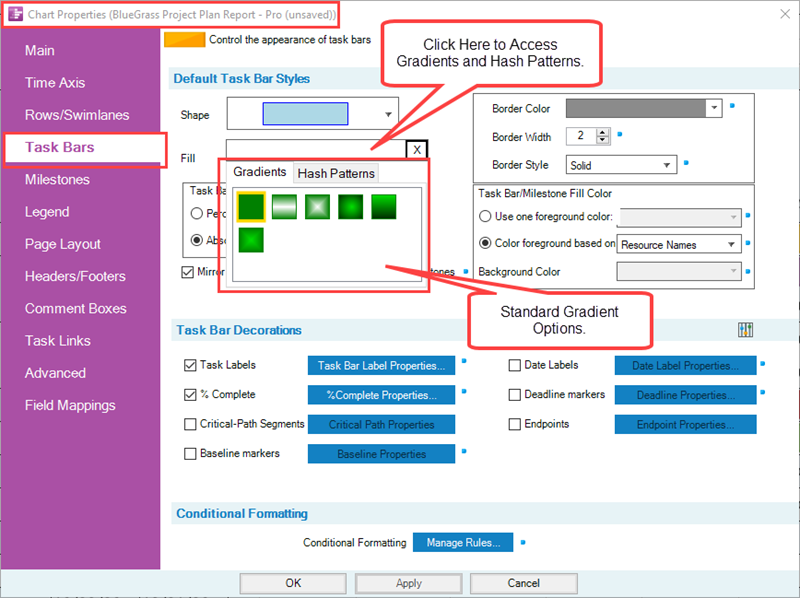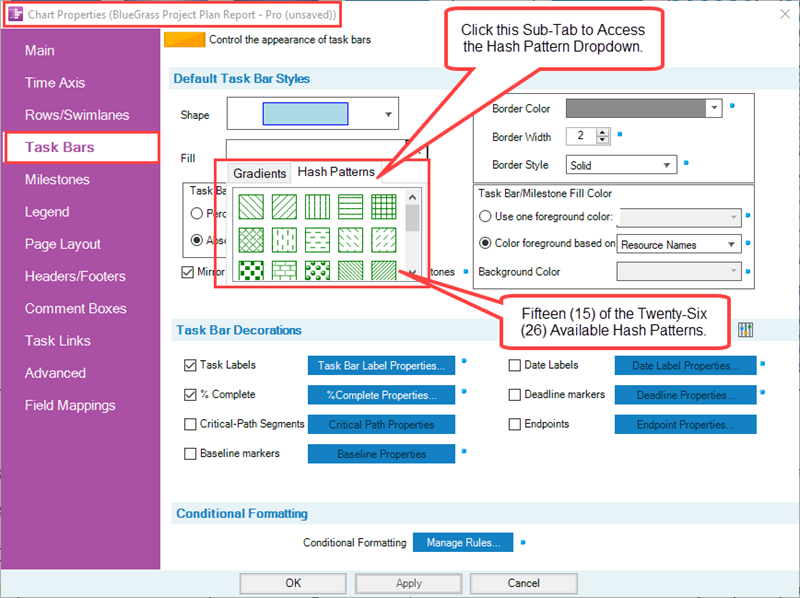TEMPzz3
Contents
- 1 Using Gradients and Hash Fill Patterns for OnePager Version 7.1 (P71-0_4_3-71-08112021.docx)
- 1.1 Overview
- 1.2 Making Global Changes to Gradient and Hash Fill Patterns for Task Bars/Milestones
- 1.3 Making Gradient and Hash Fill Patterns Changes to Individual Task Bars/Milestone Symbols
- 1.4 Making Global Changes to Gradient and Hash Fill Patterns for Task Bar/Milestone Symbol Decorations
- 1.5 Using Gradient and Hash Fill Patterns in Conditional Formatting Rules – An Example
- 1.6 Related Links
Using Gradients and Hash Fill Patterns for OnePager Version 7.1 (P71-0_4_3-71-08112021.docx)
Overview
OnePager version 7.1 is upgraded with the addition of twenty-six (26) new hash fill patterns for task bars, milestone symbols, deadlines, and endpoints. Additionally, these new hash fill patterns are available options when you configure Conditional Formatting Rules for task bars/milestone symbols and other uses. Finally, the new hash fill patterns are now combined with the available options for selecting gradient fill patterns for task bars/milestone symbols, deadlines, and endpoints and all are available for use in Conditional Formatting Rules.
The purpose of this article is to overview the upgraded gradient and hash fill pattern features and the controls available to use these features in the Chart Editor. Additionally, several examples of use are provided.
This article uses the Chart Properties form for most of its examples. For brevity, this article does not cover the features in the Template Properties form related to these version 7.1 upgrades because the controls in the Template Properties form are identical to those of the Chart Properties form.
Making Global Changes to Gradient and Hash Fill Patterns for Task Bars/Milestones
In addition to the gradient fill patterns currently available for differentiating task bars/ milestone symbols, we added a set of twenty-six (26) hash fill patterns that can be used as described above. The gradient fill patterns are shown below as an example at the Chart Properties form’s Task Bars tab’s Fill dropdown in the Default Task Bar Styles sub-section:

When you click the Hash Patterns sub-tab shown above, the dropdown form containing all the available hash fill patterns as shown here:

For a complete list of gradient and hash fill patterns, please see the article at: Glossary of Gradient and Hash Fill Patterns 29.2.1-71.
Examples of Gradient Fill Patterns and Hash Fill Patterns
Using the Chart Properties form’s Task Bars tab and the chart shown below, we can change the gradient fill pattern for all task bars/milestone symbols:

When you click the OK button, the selected gradient fill pattern is applied to all task bars as shown below:

In a similar way, starting with the original chart, all the task bars can have their fill patterns changed to a specific hash fill pattern as shown in the sequence below:

When you click the OK button, the selected hash fill pattern is applied to all task bars as shown below:

Making Gradient and Hash Fill Patterns Changes to Individual Task Bars/Milestone Symbols
Gradient fill patterns and hash fill patterns can also be applied to individually selected task bars/milestones symbols using the Change Task/Milestone Properties form. If you select a task bar as shown in the illustration below by right-clicking on the task bar and then clicking the Format command in the right-click context menu shown, you can access the Change Task/Milestone Properties form at its Format tab:

When you click the OK button on the Change Task/Milestone Properties form, the change is applied to the chart as shown here:

You can use this same technique with the Change Task/Milestone Properties form’s Format tab to apply different hash fill patterns to individual task bars/milestone symbols.
Making Global Changes to Gradient and Hash Fill Patterns for Task Bar/Milestone Symbol Decorations
In addition to now being able to apply gradient fill patterns and hash fill patterns to task bars/milestone symbols, you can also apply these new features to baseline, deadline, and the four endpoint decorations.
Complete information on task bar/milestone decorations can be found in the article at: Modifying Decorations on Tasks/Milestones (Portal) 10.0.1-71.
The controls for these task bar/milestone symbol decoration features are discussed below with specific examples.
Baseline Decorations
To apply these features to baseline decorations you need to first access the Chart Properties form at the Task Bars or Milestones tabs. At the Task Bars or Milestones tab, navigate to the Task Bars Decorations section of the form and check the Baseline Properties checkbox ON. Then click the Baselines Properties button to access the Set baseline properties form as shown in the illustration below:

When the baseline shape and hash fill pattern changes shown above are applied to the chart, the chart looks like this:

The baseline shape was changed to highlight the baseline decoration in the chart above.
Deadline Decorations
To apply these features to deadline decorations you need to first access the Chart Properties form at the Task Bars or Milestones tabs. At the Task Bars or Milestones tab, navigate to the Task Bars Decorations section of the form and check the Deadline Properties checkbox ON. Then click the Deadline Properties… button to access the Set deadline properties form as shown in the illustration below:

When the deadline shape and gradient fill pattern changes shown above are applied to the chart, the chart looks like this:

Endpoint Decorations
To apply these features to endpoint decorations you need to first access the Chart Properties form at the Task Bars or Milestones tabs. At the Task Bars or Milestones tab, navigate to the Task Bars Decorations section of the form and check the Endpoint Properties checkbox ON. Then click the Endpoint Properties… button to access the Set endpoint properties form as shown in the illustration below:

In the actions taken above, Endpoint 1 is modified to have a star shape and a specific hash fill pattern. To further illustrate endpoints, Endpoint 2 is also edited to give it a different shape and hash fill pattern for illustrative purposes. The edits made to the Set endpoint properties form for Endpoint 2 are shown below:

When the endpoint shapes and hash fill patterns changes shown in the two illustrations above are applied to the chart, the chart looks like this:

Making Gradient and Hash Fill Patterns Changes to Individual Task Bar/Milestone Symbol Decorations
Decorations for task bars and milestone symbols are applied globally. Although task bar/milestone symbol properties can be edited individually by manually selecting a task bar or milestone symbol and using the Change Task/Milestone Properties form’s Format tab to edit their properties, it is not possible to edit the shape, gradient fill pattern, or hash fill pattern of individual baseline, deadline, or endpoint decorations. OnePager is configured such that all task bar/milestone symbol decorations take on global properties.
Using Gradient and Hash Fill Patterns in Conditional Formatting Rules – An Example
Conditional Formatting Rules allow you to dynamically change the shape, color, and fill pattern of task bars/milestone symbols based upon a rule or set of rules driven by data OnePager imports from your source plan. In version 7.1 the enhancement for gradients and hash fill patterns is extended to conditional formatting rules.
Before proceeding further, if you need to refresh your knowledge of Conditional Formatting Rules, please see the articles at: Conditional Formatting (Portal) 11.0.1-71.
Example – Starting Chart Configuration
To illustrate the use of the new gradient and hash fill patterns suppose you are starting off with the chart shown below that consists of a project plan using five (5) different resources where OnePager has created the chart using different colors to represent different resources. When this is done, the Legend reflects the resources and the colors OnePager assigned. The chart looks like this:

Example – Adding Conditional Formatting Rules to Highlight an Issue
Now suppose there is an issue with Team 1 and Team 2 and you want the chart you plan to use for this schedule conversation to have the tasks that are the responsibility of Team 1 and Team 2 to stand out clearly. This can be done by adding conditional formatting rules that apply different hash fill patterns to the task bars involved. Using the Conditional Formatting Rules form shown below, you can configure rules for Team 1 and Team 2:


Example – Chart with Highlighted Task Bars Using Hash Fill Patterns
Applying these two Conditional Formatting Rules to the chart, the chart looks like this:

Conditional Formatting Rules can be formulated before the chart is created by adding the rules to the Conditional Formatting Rules form in the current Template Properties form.
Related Links
Changing Individual Task/Milestone Properties (Color, Shapes, Labels, etc.) 9.2.1-71
Modifying Decorations on Tasks/Milestones (Portal) 10.0.1-71
Conditional Formatting (Portal) 11.0.1-71
Glossary of Gradient and Hash Fill Patterns 29.2.1-71
(0.4.3-71)